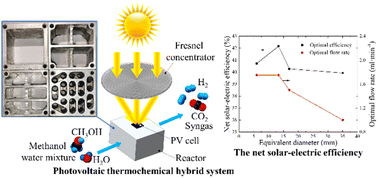Methanol steam reforming reactor design for efficient photovoltaic–thermochemical power generation
Abstract
The photovoltaic-thermochemical (PVTC) hybrid system is an emerging technology for improving the efficiencies and dispatchability of solar power via complementation between concentrated solar PV and solar thermochemical conversions. In order to improve the PV efficiency and decrease the heat losses of the reactor, the concentration ratio is usually as high as 500–1000 in the PVTC hybrid system. However, the high concentration ratio presents a serious challenge to reactor temperature uniformity and energy conversion performance. In order to improve the heat transfer performance of the reactor and the solar-electric efficiency of the PVTC hybrid system, four compact reactors for methanol steam reforming were designed and manufactured with different internal structures. Through analysis on heat transfer, flow field and reaction via numerical simulation and experimental test of the four reactors, it is found that the reactor structure has a great influence on the heat transfer and the reaction performances. At 250 °C and 1.50 ml min−1 methanol solution flow rate, the methanol conversion of the six-chamber reactor is 87.3%, 23.0 percentage points higher than that of the cavity reactor. The optimal net solar-electric efficiency of the PVTC system with the six-chamber reactor can reach 42.2% at 250 °C and 1.75 ml min−1 methanol solution flow rate, which is 3.5 percentage points higher than that of the previous study at the same operating temperature.



 Please wait while we load your content...
Please wait while we load your content...